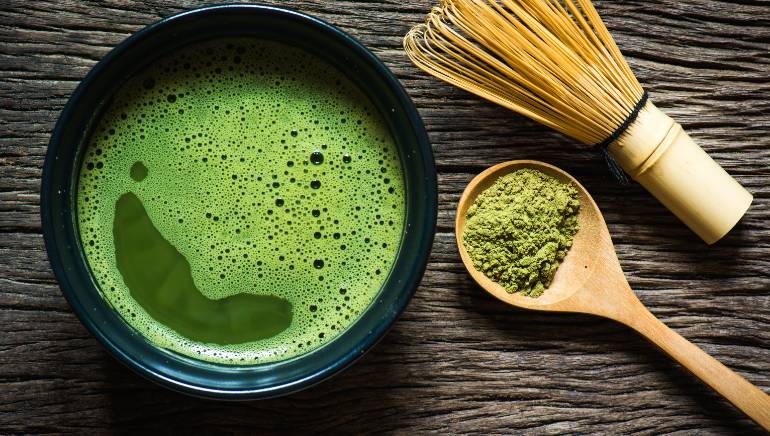
Matcha boba tea benefits: 8 reasons why you should drink it
5 months ago | 5 Views
You may have not yet tried it, but you must have definitely heard about boba tea or bubble tea or pearl milk tea. It comes in a variety of flavours like black milk tea, mango tea and, strawberry milk tea. Another popular one is matcha boba tea, which is made from matcha, a type of powdered green tea, along with milk, sugar, and tapioca pearls. Apart from the vibrant green colour, the tapioca pearls that bounce around at the bottom of the glass make this drink very appealing. The good news is that there are matcha boba tea benefits that makes it a good addition to your diet.
What is matcha boba tea?
Boba tea or bubble tea is a drink that has roots in Taiwan, but is now widely consumed across the world. Many young people drink at least a cup of boba tea per day or three cups in a week, according to research published in the Frontiers In Psychiatry journal in 2022. It has a tea base, usually black, green or white, and is mixed with milk and tapioca pearls, which have a chewy and slippery texture.

"One of the most popular flavours is matcha boba tea, which has a slightly bitter taste due to matcha," says nutritionist Diksha Dayal. The pearls are made of tapioca starch or flour, water and brown sugar, which adds sweetness to the drink. A unique textural dimension to the drink is given by the chewy tapioca pearls. Milk, usually whole milk or plant-based milk such as almond or soy, is also added to this drink. Sugar or sweetener balances out the bitterness of matcha.
What are the matcha boba tea benefits?
There is no study to support that there are matcha boba tea benefits. But matcha is one of the important ingredients of this drink, so it may offer some benefits:
1. Rich in nutrients
Matcha is a green-coloured powder made of green tea leaves from the Camellia sinensis plant. It consists of tea catechins, lutein and vitamin K, which are beneficial to health, as per research published in the Nutrients journal in 2020. It also consists of vitamin C, protein, and carbohydrates. "These nutrients offer matcha boba tea benefits by supporting overall health and well-being," says the expert.
2. Contains antioxidants
"Matcha has high levels of antioxidants, which help protect cells from damage caused by free radicals and oxidative stress," says Dayal. The antioxidant properties of matcha tea are potentially increased by the large number of polyphenols, caffeine, and amino acids in it, as per research published in the Foods journal in 2020.
3. Boosts immunity
Boosting immunity is a potential matcha boba benefit. Matcha consists of vitamin C, which is a powerful antioxidant. It can strengthen the immune defence of the body, according to research published in the Molecules journal in 2020. "The antioxidants in matcha, particularly Epigallocatechin gallate, may also enhance immune function by combating oxidative stress and supporting immune cells," says the expert.
4. May improve mental focus
Improved mental focus one of the matcha boba tea benefits. Matcha contains L-theanine, an amino acid that may promote relaxation and mental clarity. "When combined with caffeine, also found in matcha, it can help improve concentration and focus without the jittery effects often associated with high caffeine intake," says the expert.

5. May provide relief from constipation
Guar gum is an additive used in making pearls for boba tea. During a 2014 study published in the Digestive Diseases and Sciences journal, it was found that partially hydrolysed guar gum consumption may help relieve constipation. It was associated with improvements in bowel movement frequency, and the texture of stools. But don't have it in excess, as consuming it with less water may affect your bowel movement in a negative way.
6. May help with weight loss
If you are trying to lose weight then have this variety of tea. Just like green tea, weight management is also one of the health benefits of matcha tea. During a 2022 study published in the Frontiers In Nutrition, researchers found that matcha green tea helped to alleviate obesity induced by a high-fat diet.
7. May help to fight breast cancer
Matcha tea, which is also consumed as a dietary supplement, may have significant anti-cancer properties. A 2018 study published in the Aging journal indicated that matcha tea was sufficient to inhibit the propagation of breast cancer stem cells.
8. May be good for bones
Drinking tea, especially different types of green tea, including matcha, may help to get stronger bones, and reduce your risk of bone fracture. During a study published in the Nutrition Research journal in 2009, green tea seemed to be more beneficial in increasing bone mineral density than other kinds of tea. This may be due to its higher levels of plant compounds that helped to increase antioxidant capacity.
What are the side effects of matcha boba tea?
Along with matcha boba tea benefits, know about its possible side effects:
- If there are too many tapioca pearls, it may lead to digestive issues.
- High dosages of caffeine may result in shivering, anxiety, and sleepless nights.
- Boba tea has a high sugar content, which may lead to obesity.
- Tapioca pearls are made from cassava plant, so it lead to itching if you are allergic to root vegetables.
"To avoid these side effects and enjoy matcha boba tea benefits, consume it in moderation due to the presence of sugar and caffeine in it," suggests the expert.
Matcha boba tea benefits: Tip to make it healthier
- Sweeteners are often used to add flavour to this drink. Look for lower-sugar alternatives such as honey, and pure maple syrup. You can also add fruits like strawberry for the sweetness.
- Put less tapioca pearls, which are high in sugar content.
- Whole milk may be your first choice, but go for alternatives like unsweetened almond, and soy milk since they have relatively less calories.
Matcha boba tea benefits may have more to do with the finely ground powder of green tea leaves. You can enjoy it once a while, but don't make it a habit, as it can lead to weight gain, and digestive issues.
Read Also: Seaweed as the future vegan protein: Scientists unlock its hidden nutritional treasure





















